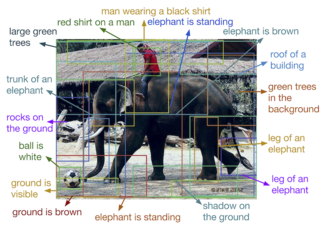Related Research Articles

Content-based image retrieval, also known as query by image content and content-based visual information retrieval (CBVIR), is the application of computer vision techniques to the image retrieval problem, that is, the problem of searching for digital images in large databases. Content-based image retrieval is opposed to traditional concept-based approaches.

Automatic image annotation is the process by which a computer system automatically assigns metadata in the form of captioning or keywords to a digital image. This application of computer vision techniques is used in image retrieval systems to organize and locate images of interest from a database.

Thomas Shi-Tao Huang was a Chinese-born American computer scientist, electrical engineer, and writer. He was a researcher and professor emeritus at the University of Illinois at Urbana-Champaign (UIUC). Huang was one of the leading figures in computer vision, pattern recognition and human computer interaction.
Michael S. Lew is a scientist in multimedia information search and retrieval at Leiden University, Netherlands. He has published over a dozen books and 150 scientific articles in the areas of content based image retrieval, computer vision, and deep learning. Notably, he had the most cited paper in the ACM Transactions on Multimedia, one of the top 10 most cited articles in the history of the ACM SIGMM, and the most cited article from the ACM International Conference on Multimedia Information Retrieval in 2008 and also in 2010. He was the opening keynote speaker for the 9th International Conference on Visual Information Systems, the Editor-in-Chief of the International Journal of Multimedia Information Retrieval (Springer), the co-founder of influential conferences such as the International Conference on Image and Video Retrieval, and the IEEE Workshop on Human Computer Interaction. He was also a founding member of the international advisory committee for the TRECVID video retrieval evaluation project, chair of the steering committee for the ACM International Conference on Multimedia Retrieval and a member of the ACM SIGMM Executive Committee. In addition, his work on convolutional fusion networks in deep learning won the best paper award at the 23rd International Conference on Multimedia Modeling. His work is frequently cited in both scientific and popular news sources.
The Large-Scale Concept Ontology for Multimedia project was a series of workshops held from April 2004 to September 2006 for the purpose of defining a standard formal vocabulary for the annotation and retrieval of video.
ACM Multimedia (ACM-MM) is the Association for Computing Machinery (ACM)'s annual conference on multimedia, sponsored by the SIGMM special interest group on multimedia in the ACM. SIGMM specializes in the field of multimedia computing, from underlying technologies to applications, theory to practice, and servers to networks to devices.

James Ze Wang is a Chinese-American computer scientist. He is a distinguished professor of the College of Information Sciences and Technology at Pennsylvania State University. He is also an affiliated professor of the Molecular, Cellular, and Integrative Biosciences Program; the Computational Science Graduate Minor; and the Social Data Analytics Graduate Program. He is co-director of the Intelligent Information Systems Laboratory. He was a visiting professor of the Robotics Institute at Carnegie Mellon University from 2007 to 2008. In 2011 and 2012, he served as a program manager in the Office of International Science and Engineering at the National Science Foundation. He is the second son of Chinese mathematician Wang Yuan.
Amit Sheth is a computer scientist at University of South Carolina in Columbia, South Carolina. He is the founding Director of the Artificial Intelligence Institute, and a Professor of Computer Science and Engineering. From 2007 to June 2019, he was the Lexis Nexis Ohio Eminent Scholar, director of the Ohio Center of Excellence in Knowledge-enabled Computing, and a Professor of Computer Science at Wright State University. Sheth's work has been cited by over 48,800 publications. He has an h-index of 106, which puts him among the top 100 computer scientists with the highest h-index. Prior to founding the Kno.e.sis Center, he served as the director of the Large Scale Distributed Information Systems Lab at the University of Georgia in Athens, Georgia.
Zhang Hongjiang is a Chinese computer scientist and executive. He was CEO of Kingsoft, managing director of Microsoft Advanced Technology Center (ATC) and chief technology officer (CTO) of Microsoft China Research and Development Group (CRD). Hongjiang is currently Chairman of BAAI. In 2022, he was elected to the National Academy of Engineering for his technical contributions and leadership in the area of multimedia computing.
Ricky J. Sethi is an Assistant Professor of Computer Science at Fitchburg State University and the Director of Research for The Madsci Network. He was appointed as a National Science Foundation (NSF) Computing Innovation Fellow by the Computing Community Consortium and the Computing Research Association. He has contributed significantly in the fields of machine learning, computer vision, social computing, and science education/eLearning.

Jitendra Malik is an Indian-American academic who is the Arthur J. Chick Professor of Electrical Engineering and Computer Sciences at the University of California, Berkeley. He is known for his research in computer vision.

Saraju Mohanty is an Indian-American professor of the Department of Computer Science and Engineering, and the director of the Smart Electronic Systems Laboratory, at the University of North Texas in Denton, Texas. Mohanty received a Glorious India Award – Rich and Famous NRIs of America in 2017 for his contributions to the discipline. Mohanty is a researcher in the areas of "smart electronics for smart cities/villages", "smart healthcare", "application-Specific things for efficient edge computing", and "methodologies for digital and mixed-signal hardware". He has made significant research contributions to security by design (SbD) for electronic systems, hardware-assisted security (HAS) and protection, high-level synthesis of digital signal processing (DSP) hardware, and mixed-signal integrated circuit computer-aided design and electronic design automation. Mohanty has been the editor-in-chief (EiC) of the IEEE Consumer Electronics Magazine during 2016-2021. He has held the Chair of the IEEE Computer Society's Technical Committee on Very Large Scale Integration during 2014-2018. He holds 4 US patents in the areas of his research, and has published 500 research articles and 5 books. He is ranked among top 2% faculty around the world in Computer Science and Engineering discipline as per the standardized citation metric adopted by the Public Library of Science Biology journal.

Yong Rui is the chief technology officer and senior vice president of Lenovo Group. He is in charge of Lenovo's technical strategy, research and development directions, and Lenovo Research, one of Lenovo's most important innovation engines.

Gang Hua is a Chinese-American computer scientist who specializes in the field of computer vision and pattern recognition. He is an IEEE Fellow, IAPR Fellow and ACM Distinguished Scientist. He is a key contributor to Microsoft's Facial Recognition technologies.

Bernd Girod is a German-American engineer, the Robert L. and Audrey S. Hancock Professor of Electrical Engineering at Stanford University. Girod is a member of the National Academy of Engineering.

Gregory D. Hager is the Mandell Bellmore Professor of Computer Science and founding director of the Johns Hopkins Malone Center for Engineering in Healthcare at Johns Hopkins University.
Jiebo Luo is a Chinese-American computer scientist, the Albert Arendt Hopeman Professor of Engineering and Professor of Computer Science at the University of Rochester. He is interested in artificial intelligence, data science and computer vision.
Hsiao-Wuen Hon is a Taiwanese-US researcher in speech technology, and coauthor of the book Spoken Language Processing. He is Corporate Vice President of Microsoft and Chairman of Microsoft's Asia-Pacific R&D Group.

Edward Y. Chang is a computer scientist, academic, and author. He is an adjunct professor of Computer Science at Stanford University, and Visiting Chair Professor of Bioinformatics and Medical Engineering at Asia University, since 2019.
References
- 1 2 "2016 Most Influential Scholars in Multimedia". Archived from the original on 2017-08-19. Retrieved 2017-08-18.
- 1 2 ACM Recognizes 2017 Fellows for Making Transformative Contributions and Advancing Technology in the Digital Age, Association for Computing Machinery, December 11, 2017, archived from the original on 2019-06-24, retrieved 2017-11-13
- ↑ "Shih-Fu Chang" (PDF). Columbia University Fu Foundation School of Engineering and Applied Science. 2018-12-25. Archived (PDF) from the original on 2021-11-02. Retrieved 2022-10-06.
- ↑ "Shih-Fu Chang's Google Scholar Profile". Archived from the original on 2016-08-10. Retrieved 2017-08-22.
- ↑ "UvA awards honorary doctorates to computer scientist Chang and epigeneticist Feinberg". Archived from the original on 2017-09-13. Retrieved 2017-09-13.
- ↑ "IEEE Fellows 2004 | IEEE Communications Society".
- ↑ Smith, John R., and Shih-Fu Chang. "VisualSEEk: a fully automated content-based image query system." In ACM international conference on Multimedia, pp. 87-98. ACM, 1997.
- ↑ Chang, Shih-Fu, William Chen, Horace J. Meng, Hari Sundaram, and Di Zhong. "A fully automated content-based video search engine supporting spatiotemporal queries." Circuits and Systems for Video Technology, IEEE Transactions on 8, no. 5 (1998): 602-615.
- ↑ Naphade, Milind, John R. Smith, Jelena Tesic, Shih-Fu Chang, Winston Hsu, Lyndon Kennedy, Alexander Hauptmann, and Jon Curtis. "Large-scale concept ontology for multimedia." IEEE multimedia 13, no. 3 (2006): 86-91.
- ↑ Borth, Damian, Rongrong Ji, Tao Chen, Thomas Breuel, and Shih-Fu Chang. "Large-scale visual sentiment ontology and detectors using adjective noun pairs." In Proceedings of ACM international conference on Multimedia, pp. 223-232. ACM, 2013.
- ↑ Ye, Guangnan, Yitong Li, Hongliang Xu, Dong Liu, and Shih-Fu Chang. "Eventnet: A large scale structured concept library for complex event detection in video." In Proceedings of ACM international conference on Multimedia, pp. 471-480. ACM, 2015.
- ↑ Li, Hongzhi, Joseph G. Ellis, Heng Ji, and Shih-Fu Chang. "Event specific multimodal pattern mining for knowledge base construction." In Proceedings of ACM on Multimedia Conference, pp. 821-830. ACM, 2016.
- ↑ Amir, Arnon, Marco Berg, Shih-Fu Chang, Winston Hsu, Giridharan Iyengar, Ching-Yung Lin, Milind Naphade et al. "IBM research TRECVID-2003 video retrieval system." NIST TRECVID-2003 (2003).
- ↑ Liu, Wei, Jun Wang, Rongrong Ji, Yu-Gang Jiang, and Shih-Fu Chang. "Supervised hashing with kernels." In Computer Vision and Pattern Recognition (CVPR), IEEE Conference on, pp. 2074-2081, 2012.
- ↑ Pedro Szekely, et al., “Building and Using a Knowledge Graph to Combat Human Trafficking,” In International Conference on Semantic Web (ICSW), Oct. 2015.
- ↑ Columbia University Content-Based Image Search System for DARPA MEMEX Project. http://www.ee.columbia.edu/dvmm/memex/
- ↑ Wang, Jun, Tony Jebara, and Shih-Fu Chang. "Semi-supervised learning using greedy max-cut." Journal of Machine Learning Research 14, no. Mar (2013): 771-800.
- 1 2 Wu, Xiao-Ming, Zhenguo Li, Anthony M. So, John Wright, and Shih-Fu Chang. "Learning with partially absorbing random walks." In Advances in Neural Information Processing Systems (NIPS), pp. 3077-3085. 2012.
- ↑ Wang, Jun, Eric Pohlmeyer, Barbara Hanna, Yu-Gang Jiang, Paul Sajda, and Shih-Fu Chang. "Brain state decoding for rapid image retrieval." In Proceedings of the 17th ACM international conference on Multimedia, pp. 945-954. ACM, 2009.